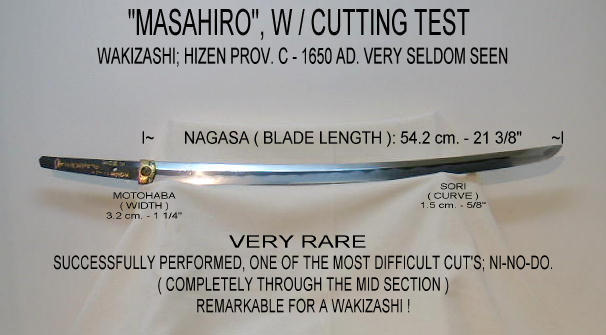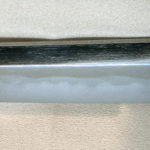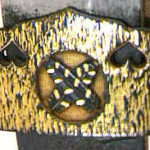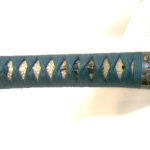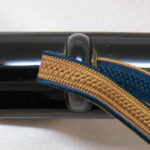Gallery Page (Display Only)
Description
“WARRIOR’S SWORD”
Hizen Masahiro WAKIZASHI!
w/ RARE CUTTING TEST
NBTHK Tokubetsu Hozon
A TAMESHIGIRI, WAKIZASHI BY; HIZEN MASAHIRO. HORIMONO OF “FUDO” THE DEITY
OF WAR, AND GUARDIAN OF SAMURAI. THE ENGRAVING STYLE IS THAT OF
“MUNENAGA”, WHO WAS ONE OF THE FINEST MASTERS OF THE PERIOD, HIS WORK
COMMANDS HIGH PREMIUM PRICES. “MUNENAGA” WORKED EXCLUSIVELY FOR
MASAHIRO, & OMI DAIJO TADAHIRO, FOR MANY YEARS. THE SWORD FITTING’S (
KODOGU) ARE 100 % IN SUITE. THE THEME IS THE “GOD FUDO”, THUS THE TERM
“WARRIOR’S SWORD”, THERE WORKMANSHIP IS SOME OF THE FINEST AVAILABLE,
AND THE “TAKANOHA” (CROSSED HAWK’S FEATHER’S) FAMILY MON (CREST)
HABAKI ( SEALING, COLLAR AROUND THE BLADE BASE ) IS A WORK OF ART, IN
ITS OWN RIGHT.
THE BLADE WAS PRODUCED IN HIZEN PROVINCE, BY 1st. GENERATION MASAHIRO,
C – 1624 AD. HE WAS A CONTEMPORARY OF HIZEN TADAHIRO, AND ONE OF THE
FINEST MAKERS OF THE TADAYOSHI SCHOOL, BOTH HE AND TADAHIRO WERE SWORD
MAKERS TO THE FAMOUS “DAIMYO HASHIMOTO”. HE IS RATED “UPPER CLASS” ( JO
– SAKU ). THE FIRST NAME HE USED AS A SWORD SMITH, WAS “MASANAGA”, HIS
GIVEN NAME WAS “SADENJIRO”, HE RECEIVED THIS FROM HIS FATHER
“YOSHINOBU”. HIS RATHER SHORT, BUT PROLIFIC CAREER ENDED IN KAN-BUN THE
5th. YEAR, OR 1665 AD., AT THE AGE OF “59” YEARS. HIS WORKS ARE SELDOM
SEEN, AND QUITE SCARCE. THIS IS THE ONLY WAKIZASHI WITH A CUTTING TEST
THAT WE HAVE EVER SEEN, OR HAVE KNOWLEDGE OF!
IT IS IN SUPERB CONDITION, AND HAS A FRESH POLISH, WITH A TSUNAGI ( WOODEN
BLADE ), AND SHIRA-SAYA ( STORAGE SCABBARD ). THERE ARE NO FLAWS.
THE CUTTING TEST IS BY ” YAMANO NAGAHISA”, AND VERY EARLY. A BIT OF THE
ZOGAN ( GOLD INLAY ) HAS FALLEN OUT, OVER THE PAST 348 YEARS ( IT COULD
BE REPLACED ). THE PIECE IS RATED “TOKUBETSU HOZON” BY THE N.B.T.H.K.!
THIS IS TRULY A “MUSEUM CLASS” WORK OF ART.
YOU ARE MOST WELCOME TO CALL 1 815 465 2299, AT ANYTIME WITH QUESTIONS.

The school of Tadayoshi in Hizen was started by Shodai (1 st ) Tadayoshi around 1598, who studied under Umetada Myoju. “Masahiro” was a student, and “great grandson of Shodai Tadayoshi”, his father Yoshinobu also assisted in his teachings. Masahiro started signing swords using the name Masanaga. (Masahiro also used to sign swords for Tadayoshi when he became ill (dai mei). “Lord Nabeshima” had seen the skill he had and told him he should start signing his works as Masahiro. (given the character “hiro” by the lord). He eventually had his own line of students working under him, even training Nidai Tadahiro (2 nd ). The swords of Hizen were among the most popular in Japans history, with orders being placed from all over the country; some being gifted to foreign dignitaries from the Shogun. The Tadayoshi name lived for close to 300 years, finally ending with 9 th generation in 1880.
The Hizen schools notable characteristics were that all katana were signed tachi mei, with wakizashi and tanto signed katana mei. The preferred style of hamon was suguba, midare and notare (with some examples of choji-midare) with brilliant nie; (The mainline Tadayoshi smiths mastered the Rai school style of suguba hamon). Hada was typically very tightly forged ko-mokume (often referred to nashiji hada). The sori of their swords was considered nearly perfect for cutting among the samurai.
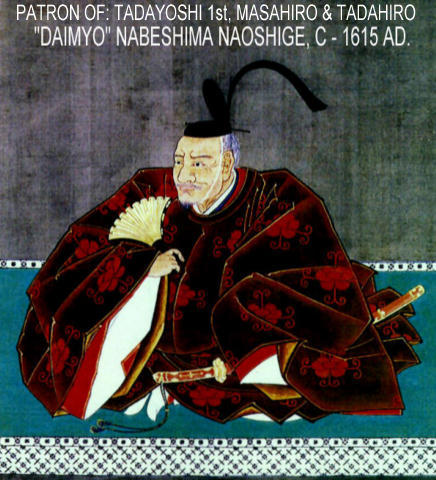
In the late 16th century, the feudal lord Nabeshima Naoshige would write a set of wall inscriptions for his followers. Historians describe the wall inscriptions as “Everyday wisdom, rather than house laws proper” Lord Nabeshima’s written works also include a mention of bushido:
- “Bushido is in being crazy to die. Fifty or more could not kill one such a man”
In 1584, Nabeshima Naoshige was the chief retainer for the Lord of Hizen until he was killed in battle by the forces of the powerful Shimazu Clan. After his lord’s death, Nabeshima became the true leader of the fiefdom and fought against the Shimazu again in 1587. A Sengoku era warlord, Nabeshima distinguished himself in battle by killing hundreds of men. He was later sent on Hideyoshi’s Korean campaigns where he struck up a friendship with Kato Kiyomasa and upon his return to Hizen, Tokugawa Ieyasu.
At Sekigahara, Lord Nabeshima’s son, Katsushige, was convinced to take sides against Tokugawa Ieyasu. Nabeshima wisely recalled him to attack Tokugawa’s enemies in Kyushu, thus saving the clan from disaster. Historians describe Nabeshima as “a survivor and a man of quick intelligence” who saved his domain from invasion several times. His actions and sayings are immortalized in the third chapter of the Hagakure by writer Tsunetomo Yamamoto, a close attendant of Nabeshima Naoshige’s grandson, Mitsushige.
Gallery
This Sword is not available for purchase.
If you wish to purchase a Japanese Sword please view our Nihonto for sale page or contact us directly via email or contact us at 1(608) 315-0083 any time, please include specifics of what you seek, i.e.: Katana, maker, era, price range etc.
Pictures and content may not be copied without the express permission of samuraisword.com ©


